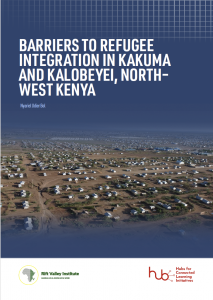Why are the majority of refugees in Kakuma and Kalobeyei refugee camps in north–west Kenya resistant to the Kenyan government’s new official policy of integration with the local community? This paper explores this question through personal interviews and focus group discussions with a selection of refugees in the two settlement complexes and through a review of secondary literature. The paper argues that resistance among refugees to integration is not simply a reaction to external pressure but is deeply rooted in their lived experiences and fears of losing support from humanitarian agencies. It is also rooted in their concerns about the social and economic implications of assimilation into Kenyan society. Contrary to the general perception that refugees should be grateful for opportunities to integrate, many view the loss of their refugee status as a threat to their survival and identity. This perspective is crucial to understanding the dynamics of refugee-host relations, particularly in settlements such as Kakuma and Kalobeyei where competition for scarce resources is exacerbated by climate change, further complicating the integration process. Overall, the findings in this paper suggest that integration is a complex process shaped by social and environmental factors, rather than a one-off process that occurs on the whim of external actors and their imagined preferences for ‘helpless’ refugee populations.
This paper has been published as a result of Nyariel’s training with the Rift Valley Institute’s (RVI) Research Communities of Practice (RCoP) project, a partnership carried out with funding from the Open Society University Network Hubs for Connected Learning Initiatives. It therefore reflects the views of the author and not the views or position of the Rift Valley Institute. RCoP is among several RVI flagship projects that support the professional development of early career researchers in eastern and central Africa through training, mentorship and the dissemination of research outputs. It is a values-driven project based on RVI’s long-term experience and presence in the region, built around a community of practitioners and academics with a common interest in the professional development of early career researchers. In the third phase of the project, RVI trained seven early career researchers from Kakuma refugee camp between May and October 2024.




